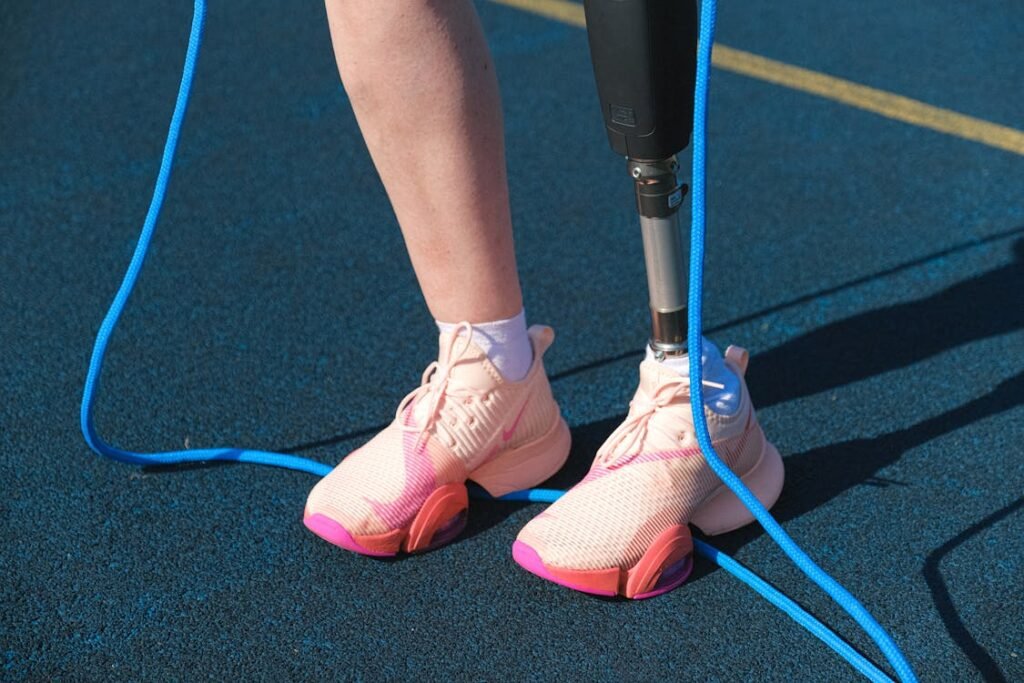For many children with prosthetics, the first steps toward confidence don’t always begin in the classroom or the clinic. Sometimes, they begin on a field, in a swimming pool, or during a simple game with friends. Movement has always been a natural part of childhood. It’s where kids grow, discover what they’re capable of, and find their place in the world. But when a child uses a prosthetic limb, stepping into that space can feel uncertain at first.
That’s where adaptive sports come in.
These are sports specially designed or adjusted for children with physical differences. They don’t just build strength and skill—they build self-belief. They offer kids the chance to play, to compete, and to feel proud of their abilities. More than that, adaptive sports help children with prosthetics feel included, accepted, and encouraged.
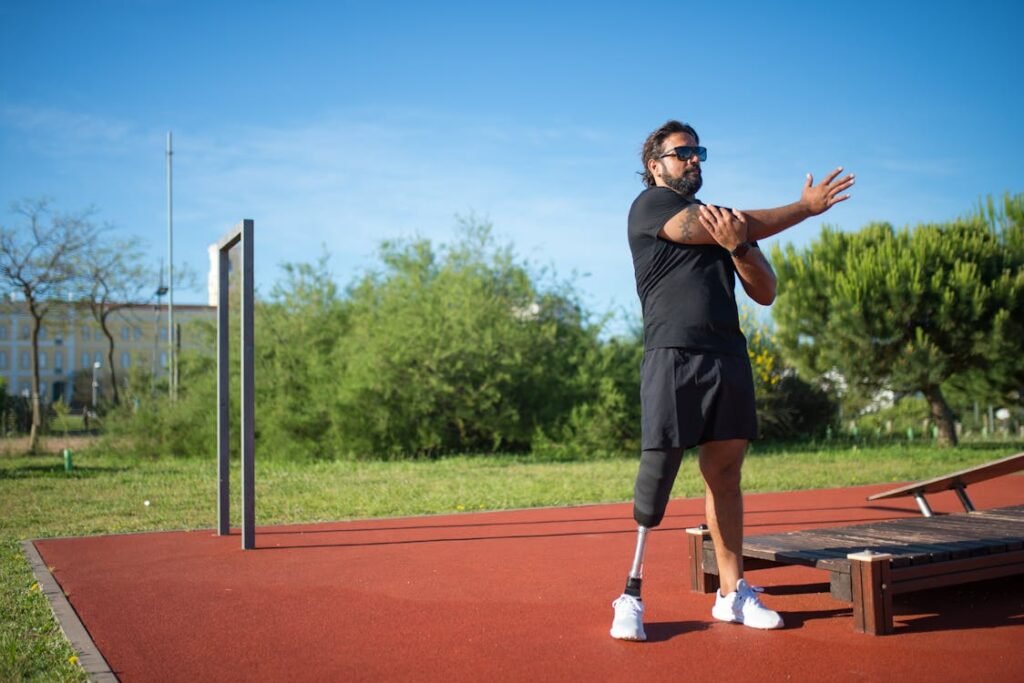
How Adaptive Sports Help Shape Identity and Confidence
Moving From Limitation to Possibility
When a child receives a prosthetic, it’s often seen as a medical moment—one focused on function, mobility, and adjustment. But for the child, it’s also an emotional shift.
They’re not just learning how to walk or grip again—they’re learning how to be seen, how to interact with others, and how to rebuild their sense of what’s possible.
Adaptive sports create a space where these emotional shifts can happen in a natural and joyful way. On a court or in a pool, children don’t feel like patients—they feel like players. Instead of focusing on what they can’t do, they begin to notice what they can do.
The first time a child scores a goal, swings a racket, or finishes a race, something changes. That win, no matter how small, is deeply personal. It’s proof to themselves—and often to others—that they are not limited by their prosthetic. They are growing with it.
This shift in mindset is one of the most powerful outcomes of adaptive sports. Confidence built through play is different from confidence taught in words. It comes from experience, from the feeling of doing something you weren’t sure you could do.
Building Comfort With the Prosthetic Through Play
One of the challenges children face when using a new prosthetic is getting used to how it feels and moves. Therapy sessions are helpful, but they can be structured and slow.
Sports, on the other hand, provide a fun and less pressured way to explore motion, balance, and control. Running on a field or swinging an arm while throwing a ball helps children understand how their body moves with the prosthetic.
As children engage in regular movement, their muscles become stronger and more coordinated. This natural exercise improves not just their ability to move, but their comfort with the prosthetic itself.
They stop noticing it as something separate and start treating it as part of them. This connection helps reduce hesitation, frustration, and fear—making daily use of the prosthetic easier and more natural.
Even simple games like tag, cycling, or catch can play a big role in this process. What might look like play from the outside is actually deep learning for the child—both physically and mentally.
Encouraging Peer Interaction and Inclusion
Children want to connect. They want to make friends, laugh, share stories, and feel like they belong. For kids with prosthetics, this can sometimes be hard.
They may feel different from their classmates, unsure about how others will respond, or hesitant to join in.
Adaptive sports open the door to connection. When children play together on an even playing field, differences begin to fade.
Teammates focus on teamwork, not physical differences. Children learn to cheer each other on, offer support, and share goals. Through sport, relationships form in a way that feels organic and supportive.
This interaction builds social confidence. It teaches children how to communicate, how to work with others, and how to feel comfortable in group settings.
These skills carry over into school, friendships, and family life—helping kids become more confident and self-assured in all areas of their world.
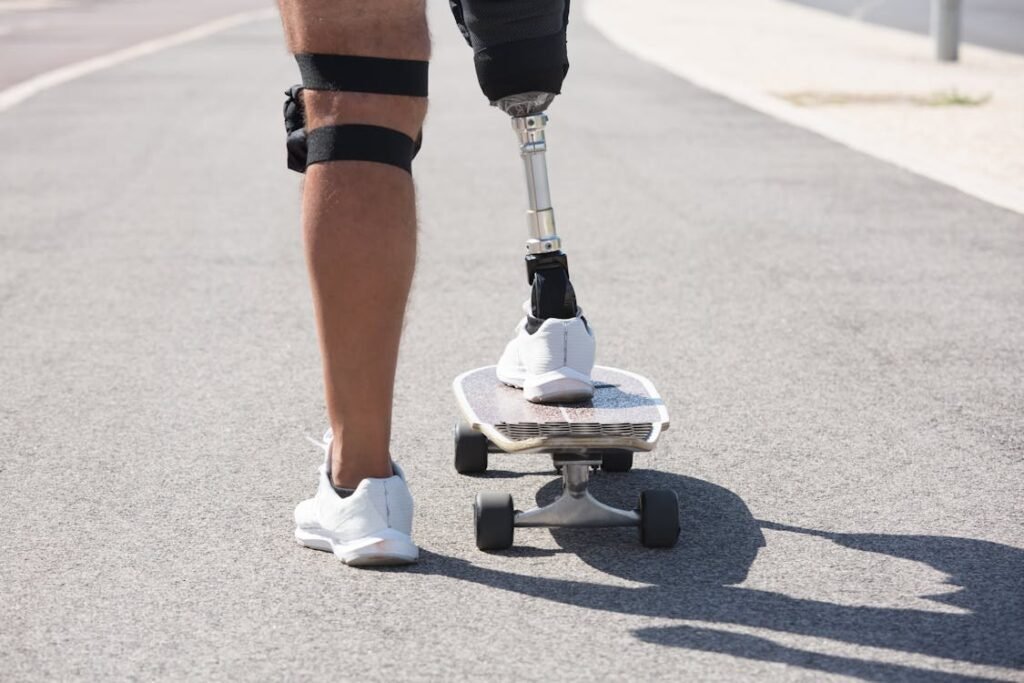
The Emotional Impact of Sport: Self-Esteem, Motivation, and Resilience
Growing Pride Through Achievement
There’s something deeply powerful about finishing a race, scoring a goal, or mastering a new skill—especially when you weren’t sure you could do it in the first place.
For children with prosthetics, adaptive sports create meaningful moments of accomplishment. These are not just physical milestones—they’re emotional ones.
Every small achievement helps build a stronger sense of self-worth. When a child hits a ball for the first time, or keeps up with teammates during a practice, that moment sticks.
It tells them, I can do this. Over time, these moments shape how they see themselves. They’re not just someone who has a prosthetic. They’re an athlete. A teammate. A doer.
This kind of pride is essential. It fuels motivation, and it changes how children face challenges—not just in sport, but in life. It teaches them to keep trying, to set goals, and to trust that they can improve with effort.
And when they fail or fall short, sports help them bounce back. They learn that failure isn’t final—it’s part of the process.
That kind of mindset, when formed early, supports resilience. It gives children the tools they need to face everyday difficulties—like school pressure, social awkwardness, or prosthetic maintenance—with a greater sense of calm and control.
Encouraging Independence and Responsibility
Sports also give children something that can be hard to build through words alone: a sense of independence.
When a child joins a team or commits to a practice, they begin taking responsibility for their progress. They learn how to manage their schedule, prepare their gear, and show up ready to participate.
These responsibilities may seem small, but they’re powerful for children who are used to being helped or managed because of their prosthetic. In sport, they are the ones in control.
They decide how hard to push, when to rest, and how to improve. This independence spills over into other areas of life, helping them take more ownership over schoolwork, daily routines, and personal care.
And when children see the results of their own effort—improving their speed, balance, or teamwork—they begin to believe in their ability to shape their own success. That’s a belief that stays with them for life.
Strengthening the Parent-Child Bond
Adaptive sports don’t just benefit the child—they also bring families closer. For many parents, watching their child struggle with mobility or confidence can be heartbreaking.
Seeing them thrive in a sport, surrounded by joy and effort, brings a new kind of connection. It changes the narrative from one of worry to one of pride.
Parents often become part of the experience—helping with transport, cheering from the sidelines, or celebrating milestones. These shared experiences build memories, deepen bonds, and create a sense of team within the family itself.
Sport also gives parents a clearer picture of their child’s abilities. Instead of focusing on what their child might need help with, they begin to see all the things their child can do—independently, joyfully, and with confidence.
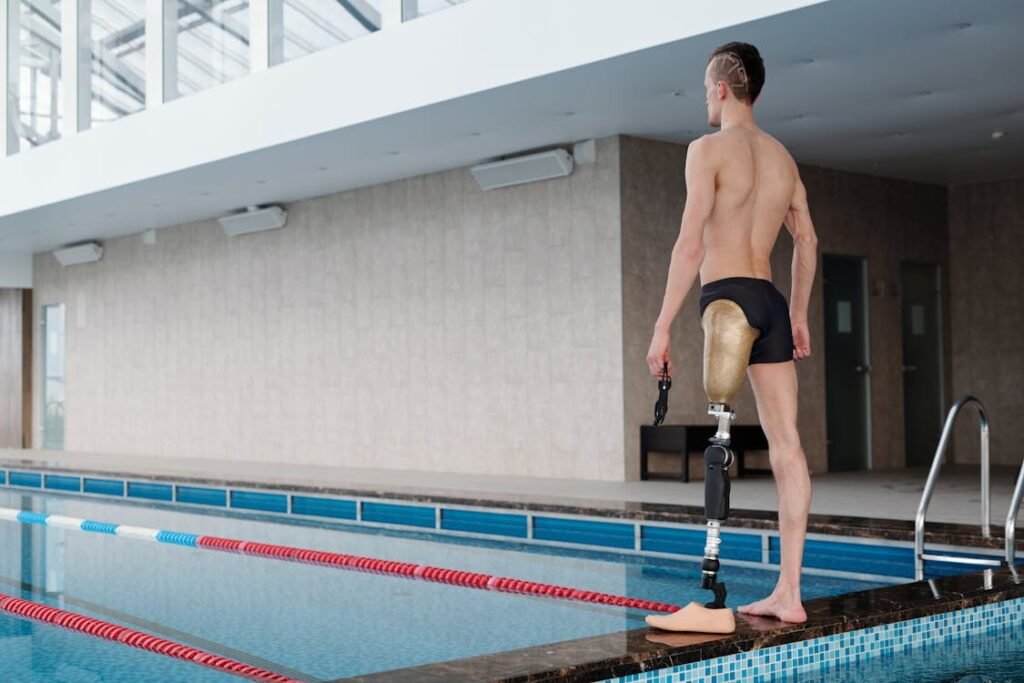
Overcoming Barriers: Making Adaptive Sports More Accessible
Recognizing the Gaps in Opportunity
While the benefits of adaptive sports are clear, not every child with a prosthetic has access to them. Across many parts of India and in other countries too, children face real barriers—lack of infrastructure, limited programs, and even social hesitation.
Some families may not know where to begin or may feel unsure if their child is “ready” for sports. Others may face cultural or financial constraints that make regular participation difficult.
In some cases, schools are not equipped with inclusive physical education programs. Coaches may lack training, or there may be limited awareness of how to safely include children with prosthetics in group activities.
This often leads to kids being left out—not because they can’t participate, but because the system hasn’t yet adapted to include them.
Breaking through these barriers means starting with awareness. Parents, teachers, and community leaders need to know that adaptive sports are not about competition—they’re about inclusion.
They are about creating a space where every child can explore movement and enjoy it in their own way.
Even small steps, like organizing inclusive play sessions at school or introducing basic movement games in community centers, can start to change the local environment.
The more children see others like them participating, the more confident they become to step forward themselves.
Supporting Families With Resources and Guidance
Many families simply don’t know where to start when it comes to adaptive sports. They might wonder which activities are safe, whether they need a special prosthetic, or how to find a coach who understands their child’s needs. This lack of guidance can lead to hesitation or delay.
What’s needed is a more open and approachable system—one that not only offers options, but supports families in choosing the right one.
Pediatricians, prosthetists, and therapists can all play a role in encouraging early movement. Schools can help by making physical activity part of every child’s day, not just those who excel in it.
Sports organizations, too, can partner with healthcare professionals to host open days or trial sessions, giving children a chance to try different activities without pressure.
Families who have already found success in adaptive sports can also make a big difference by sharing their stories.
A single conversation between two parents can often do more than a brochure or a flyer. It’s in these personal moments that doubts disappear and confidence begins to grow.
The Role of Custom-Fit Prosthetics in Sport
While any physical activity is good, certain sports may require a prosthetic that’s adapted for movement. For instance, running, cycling, or racket sports place specific demands on grip, shock absorption, or balance.
A child using a prosthetic that wasn’t designed for such activities may feel discomfort or instability, which can discourage them from continuing.
This is where well-designed, child-specific prosthetics come in. They support natural movement and allow for better control.
Lightweight designs help reduce fatigue, and ergonomic shaping improves comfort during quick or repeated motions. When the prosthetic moves in sync with the child’s body, sport becomes more enjoyable, not more difficult.
That said, sport doesn’t require high-tech solutions from day one. What matters most is having a starting point.
Many children begin with basic equipment and gradually move toward more specialized limbs as their interest and skill level grow. The key is giving them the space to explore, adjust, and participate—without fear or pressure.
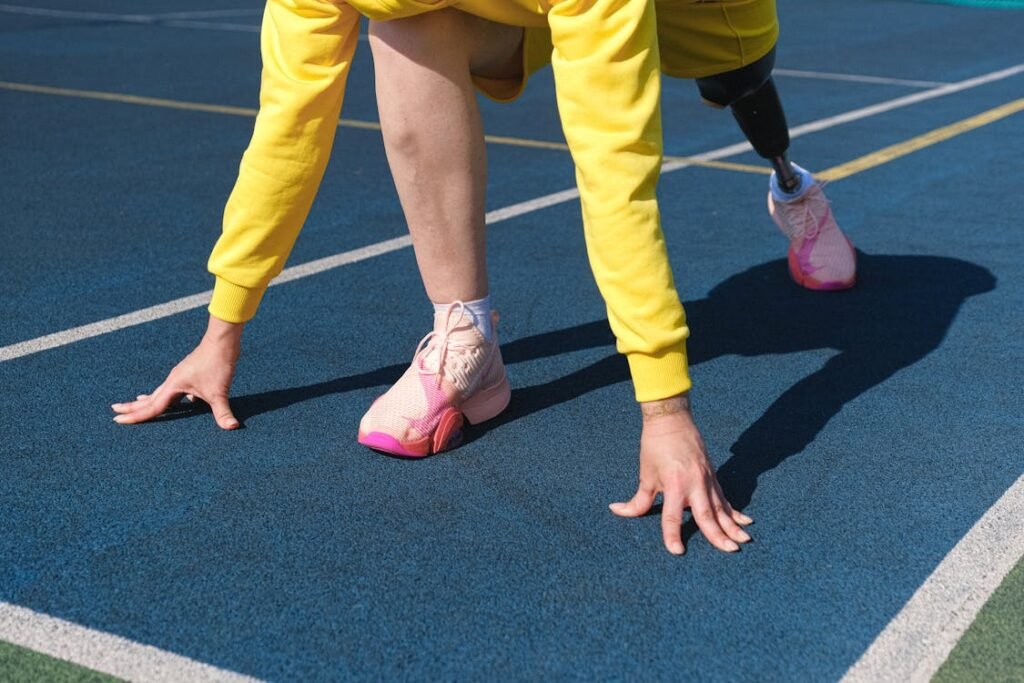
Encouraging a Culture of Inclusion Through Sport
Changing Perceptions in Schools and Communities
For many children with prosthetics, the first place they encounter a sense of “difference” is often at school.
Classmates may not understand what a prosthetic is, teachers might be unsure how to include them in games, and physical education activities might not be adapted to various abilities.
These small barriers, though often unintentional, can make a child feel excluded or hesitant to join in.
That’s why encouraging a culture of inclusion must begin in everyday spaces—especially schools and community centers. Inclusion doesn’t always mean big changes.
Often, it’s the smaller decisions that matter most. Making sure sports days have accessible events, encouraging teachers to involve every child in team games, or simply promoting open conversations about prosthetics can begin to shift the environment from cautious to welcoming.
When children with prosthetics are seen not just as participants but as equals in sports activities, it sends a powerful message.
It shows that inclusion isn’t about sympathy—it’s about fairness. It teaches all children, not just those with prosthetics, that ability comes in many forms.
Inclusive sports don’t just help children with prosthetics thrive—they also help their peers grow into more empathetic, supportive individuals.
Sports become a space for learning, for teamwork, and for breaking down invisible walls that might otherwise divide children by ability.
The Importance of Representation
Representation in sport is about more than just seeing someone like you play—it’s about knowing that you belong there too.
When children with prosthetics see athletes, role models, or even classmates actively participating in sports, it gives them permission to imagine themselves in the same space.
This is especially important in the early years, when children are still forming beliefs about who they are and what’s possible.
Seeing someone with a limb difference running a race, kicking a football, or swimming with confidence creates a strong and lasting impact. It tells them, You’re not alone. You can do this too.
This kind of representation doesn’t always have to come from elite athletes. Local success stories—whether it’s a child who joined a school team, a teen who plays in a weekend league, or a group of kids who train together after school—can be just as powerful. These stories make sport feel closer, more achievable, and more meaningful.
Celebrating these achievements in schools, clinics, and local events helps normalize prosthetic use and reshapes the public perception of disability. It builds a society that looks at ability before difference.
Long-Term Benefits That Reach Beyond Sport
Adaptive sports aren’t just about physical health or emotional growth. Over time, they shape how children view themselves in the world.
A child who plays sports gains more than muscle—they gain structure, routine, and a community. These are the same ingredients that support success in school, relationships, and future careers.
Children who participate in adaptive sports often carry their confidence into other areas of life. They’re more likely to try new activities, speak up in class, or pursue goals that once seemed too far away.
The ability to say, “I did that,” on the field or court often becomes the foundation for believing “I can do this,” in other parts of life.
That mindset—one of resilience, capability, and belonging—is one of the most valuable things any child can carry with them. And it all starts with one chance to move, to play, and to be seen.
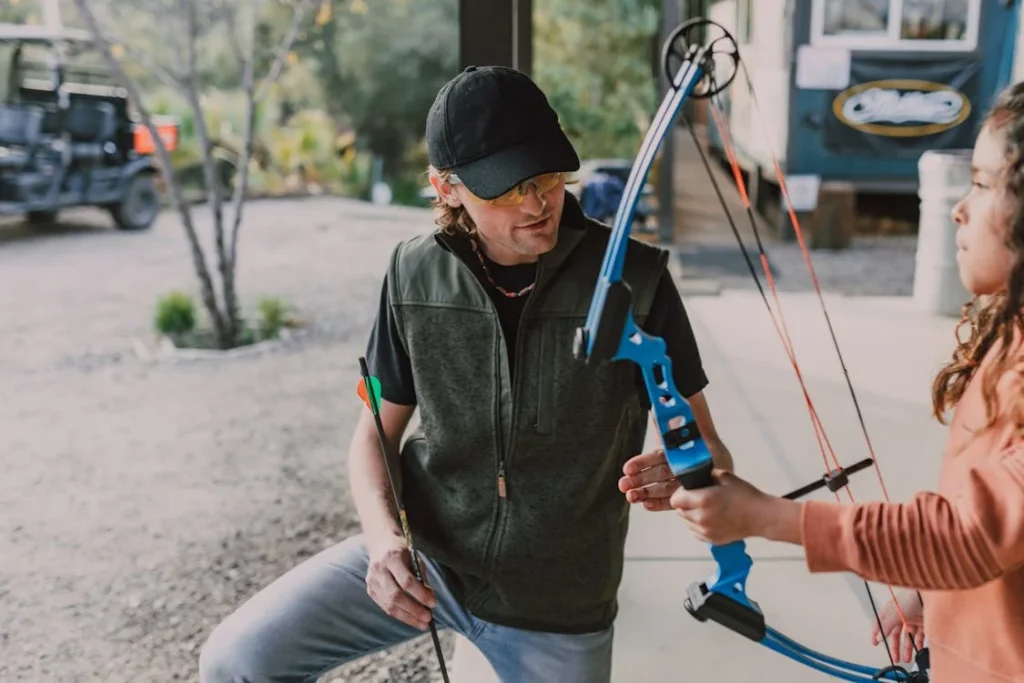
The Influence of Coaches and Mentors in Adaptive Sports
More Than a Coach: Becoming a Believer in the Child’s Potential
For any child, a good coach can be a powerful force. For a child with a prosthetic, the role of a coach often carries even more meaning.
Coaches are among the first people outside the family to treat the child as an athlete—not as someone with a limitation. That shift in how the child is seen can create a ripple effect in how they see themselves.
When a coach believes in a child’s potential, that belief becomes contagious. It can help the child take their first steps onto the court or into the pool with less hesitation.
Even when the child is unsure, a supportive coach acts as a steady voice saying, You’ve got this. Let’s try again.
This kind of encouragement is especially important during the early phase of sport participation, when the child is still learning how to move with the prosthetic.
A well-trained coach will understand that progress may look different, but it is progress all the same. They know when to push and when to pause, and how to adjust training to fit the child’s pace.
Teaching Skills That Go Beyond the Game
While coaches teach how to kick, throw, or swim—they also teach life lessons. Through adaptive sports, coaches help children understand responsibility, effort, teamwork, and focus.
These lessons become part of the child’s personal toolkit, shaping how they deal with challenges well beyond sports.
A coach’s approach can also help children with prosthetics gain emotional maturity. For example, when a child loses a match or struggles with a technique, a good mentor helps them manage frustration without shutting down. They teach the child how to bounce back, reframe the moment, and stay engaged.
This guidance is especially valuable for children who might already be dealing with self-doubt, isolation, or anxiety related to their limb difference.
A coach who listens, adapts, and leads with empathy can become one of the most trusted figures in a child’s life.
Creating Safe and Motivating Spaces
A child is more likely to participate, practice, and push their limits when they feel safe. Coaches play a key role in creating that safety—not just physically, but emotionally.
They model respect, build routines, and set clear expectations. This gives children with prosthetics a reliable framework to step into and grow from.
But just as importantly, coaches also create spaces where children can have fun. The freedom to laugh, make mistakes, and enjoy movement without being judged is what makes sport sustainable for any child.
For a child with a prosthetic, this kind of joyful, low-pressure environment is often what turns early hesitation into lasting love for sport.
Some coaches even become long-term mentors, staying involved as the child grows, tries new sports, or takes on leadership roles.
These ongoing relationships offer children something even more valuable than skill—they offer stability, connection, and a sense of being truly seen.
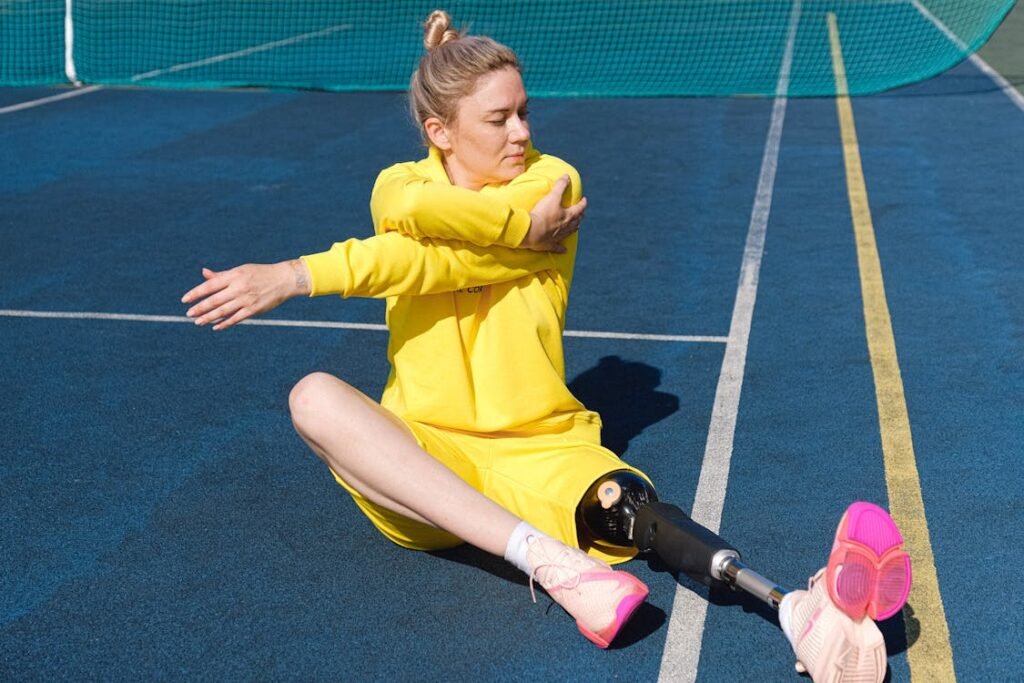
How Adaptive Sports Help Normalize Prosthetic Use in Society
Shifting the Public Gaze
In many communities, prosthetics are still viewed with a mix of curiosity, confusion, or even discomfort. Children who wear them often feel those eyes—at school, in parks, or on public transport.
The stares may not be cruel, but they can still make a child feel out of place. Adaptive sports offer a powerful way to change that narrative—not just for the child wearing the prosthetic, but for everyone watching.
When children with prosthetics are seen participating in sports, running alongside peers, or competing in events, it starts to reframe how the public views disability.
Suddenly, the focus is not on what’s missing, but on what’s possible. A child using a running blade or a lightweight arm isn’t being stared at with pity—they’re being cheered on for their speed, strength, or skill.
This kind of visibility matters. It pushes prosthetics into the realm of the familiar. It replaces stigma with admiration.
And most importantly, it helps children see their own devices as tools of power—not as something they need to hide.
Encouraging Open Conversations
Sports events—especially community matches or school competitions—often become natural opportunities for people to ask questions and learn.
When prosthetics are seen in action, they spark curiosity. Parents, peers, and spectators may want to understand more: How does it work? Can they really play with that? Does it hurt?
In these moments, children and their families often get the chance to explain—not from a place of defense, but from a place of pride.
This shifts the tone of public conversation around disability. It moves it away from stereotypes and toward informed, respectful dialogue.
Children who grow up playing sports with their prosthetics often become more confident in talking about them.
They’re not afraid to explain how their device helps them, or how it feels. Over time, this openness builds bridges—not just between individuals, but between communities and cultures.
Inspiring New Policies and Programs
As adaptive sports become more visible and more accepted, they also begin to influence larger systems.
Schools, local governments, and sports federations take notice. What once felt like a niche idea—creating inclusive physical education, offering funding for sports prosthetics, or training coaches in adaptive methods—starts to feel like a public good.
In many places, the growth of youth adaptive sports has led to real policy change. New playgrounds have been built with inclusive design in mind. Sports leagues have added categories for children with disabilities.
Public funding has been directed toward accessible gear and coaching support. None of this would be possible without the everyday visibility of children with prosthetics participating in sports—and thriving.
This kind of change benefits not just individuals, but entire communities. It builds more equal spaces. It challenges outdated thinking.
And it sends a clear message that every child, regardless of ability, deserves the chance to move, compete, and shine.
Conclusion
Adaptive sports offer far more than physical activity—they help children with prosthetics build confidence, independence, and a strong sense of self. Through play and movement, children discover what they can do, not what they lack. They develop pride in their bodies, comfort with their prosthetics, and the resilience to face challenges in every part of life.
From emotional growth to social inclusion, from better mobility to stronger identity, the impact of sport reaches far beyond the field. It creates spaces where children feel seen, capable, and empowered. It also shifts how families, schools, and society view disability—moving the focus from limitations to strength.
Every child deserves a chance to play, to be part of a team, and to grow through movement. And with the right support, guidance, and inclusion, adaptive sports can be that starting point.
The field is open. Let them play. Let them thrive.



